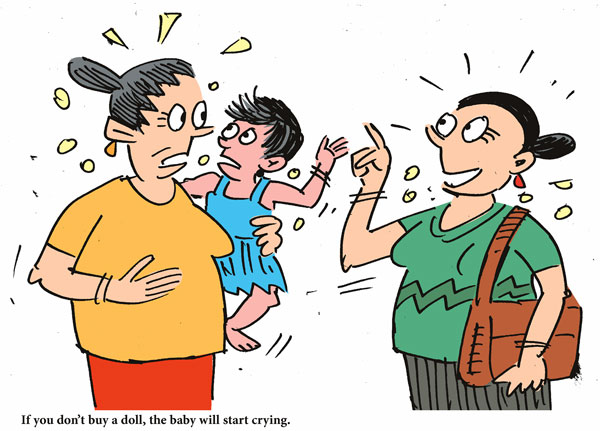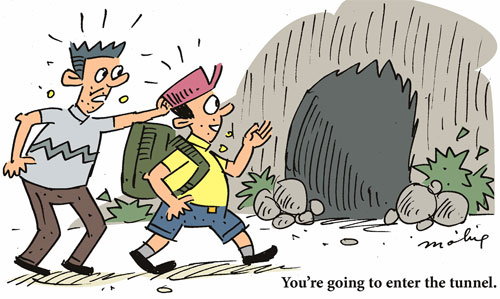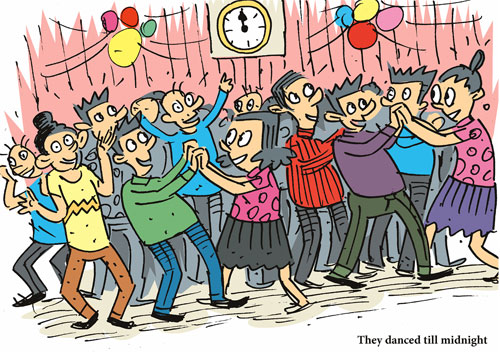
'Will' for predicting the future
The word 'predict' means to say that something will happen, before it
happens.
The prices of books at the International Book Fair were lower than
predicted.
Newspapers have predicted that XYZ Party will win the election. The
doctor says it is difficult to predict what the long-term effects of the
accident will be.
As the Meteorological Department has predicted there will be thunder
showers in the Western Province. Scientists can predict earthquakes and
volcanic eruptions.
We use 'will' + infinitive to predict about the future.
I think it will rain in the evening.
Hurry up or you will miss the bus.

If you don't buy a doll, the baby will start crying.
All that money will not change me.
It will not rain tomorrow.
'Will' + infinitive can be used to ask questions.
Will it rain tonight?
When will you know your examination results?
Will she teach you how to dance?
Will he get an appointment to meet the minister?
Will I be famous in 10 years?
We use 'will' when we decide or agree to do something.
I will not (won't) smoke from today.
He will call you for the interview.
I am sure she will not speak to me.
The bus will not (won't) start. There's some engine trouble.
A: There's somebody at the door.
B: I'll go. (NOT 'I go,')
There are certain differences in usage when we use 'will', 'going to'
or the present progressive tense.
However, we can use two or three different forms to talk about the same
idea.
Look out! You're going to enter the tunnel.
Don't give that doll to her. She'll break it.
Mary is going to have a baby.
Perhaps we'll meet again.
Be careful, you'll fall into the river.
When we talk about plans we can use either the 'going to' form or the
present progressive tense.
I am going to see the principal now.
I am meeting the principal now.
Activity
Make promises with 'will' or 'won't'. Check your answers with the key.
1. I ......always tell the truth.
2. I ...... be nice to everybody in office.
3. I ...... drive too fast on the highway.
4. I ...... go for a walk everyday.
5. I ...... go to bed early everyday.
6. I ...... learn French because it is very useful.
7. I ...... read more books than anybody else in my class.
8. I ...... smoke because it is bad for my health.
9. I ...... think about myself too much.
10. I ..... succeed in life.
Simple past tense

The simple past tense of verbs do not change according to the
subject.
I worked hard yesterday.
We worked hard yesterday.
You worked hard yesterday.
He worked hard yesterday.
She worked hard yesterday.
They worked hard yesterday.
Regular verbs end in 'ed' in the past tense. However, irregular verbs
have different endings in the past tense. Beginners have to make an
effort to remember them.
Fortunately, many verbs are regular.
They danced till midnight.
We played cricket in the evening.
Mother cooked potatoes.
She liked the party.
The receptionist answered the telephone.
Activity
In column 'A' we give 30 irregular verbs. Write the past tense in
column 'B' and check your answers with the key.
Column A Column B

1. Arise .............
2. Awake .............
3. Babysit .............
4. Bear .............
5. Beat .............
6. Become .............
7. Befall .............
8. Beget .............
9. Begin .............
10. Behold .............
11. Bend .............
12. Beseech .............
13. Beset .............
14. Bet .............
15. Bid .............
16. Bind .............
17. Bite .............
18. Bleed .............
19. Blow .............
20. Break .............
21. Breast-feed .............
22. Breed .............
23. Bring .............
24. Broadcast .............
25. Browbeat .............
26. Build .............
27. Burn .............
28. Burst .............
29. Bust .............
30. Buy .............
<<<<<<>>>>>>>
Key
1. arose
2. awoke
3. babysat
4. bore
5. beat
6. became
7. befell
8. begot
9. began
10. beheld
11. bent
12. besought
13. beset
14. bet
15.bade
16. bound
17. bit
18. bled
19. blew
20. broke
21. breast-fed
22. bred
23. brought
24. broadcast
25. browbeat
26. built
27. burnt
28. burst
29. bust
30. bought
Match words and meanings
Here's an interesting quiz to enrich your vocabulary. Match the words
in Column 'A' with their meanings in Column 'B' and check your answers
with the key. The first one has been done for you.
Column A Column B
Y 1. Atelier A. able to be heard
.... 2. Atheist B. reddish brown
.... 3. Athlete C. different from all the others of its type
.... 4. Atlas D. a quality that some body or something has
.... 5. Atmosphere E. very pleasing in appearance
.... 6. Atoll F. lawyer
.... 7. Atom G. clothes
.... 8. Atop H. a room at the top of a building for storing things
.... 9. Atrocious I. to say that something is true
... 10. Attach J. to make something smaller, thinner or weaker
... 11. Attack K. listening carefully
... 12. Attain L. somebody who goes to a place or event
... 13. Attend M. to go to an event or place
... 14. Attendee N. to achieve
... 15. Attentive O. a violent act intended to hurt
... 16. Attenuate P. to fasten
... 17. Attest Q. of very bad quality
... 18. Attic R. on or at the top of
... 19. Attire S. the smallest unit of any chemical element
... 20. Attorney T. a ring-shaped island formed of coral
... 21. Attractive U. the mixture of gases around the earth
... 22. Attribute V. a book containing maps
... 23. Atypical W. somebody who is good at sports
... 24. Auburn X. somebody who believes that God does not exist
... 25. Audible Y. a room or building in which an artist works
<<<<<<<<>>>>>
Key
2. X 3. W 4. V 5. U 6. T 7. S 8. R 9. Q 10. P 11. O 12. N 13. M 14. L
15. K 16. J 17. I 18. H 19. G 20. F 21. E 22. D 23. C 24. B 25. A
|

